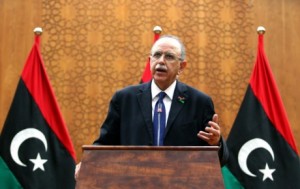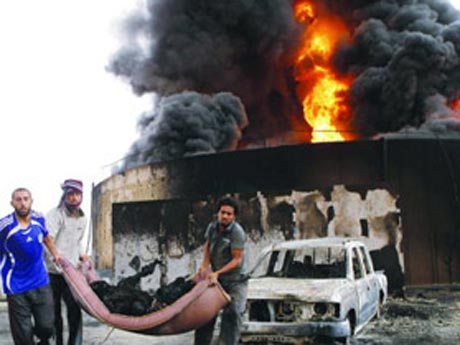By George Grant
London, 25 May:
Prime Minister Abdurrahim El-Kib has said that Law 37 and other “such laws” will “disappear from the . . .[restrict]scene” following national elections scheduled for next month.
The pledge was made today at an event at the Chatham House think-tank in London, where El-Kib was speaking following a visit to British Prime Minister David Cameron.
“I guarantee that once we get to elections and have a National Congress formed, such laws will disappear from the scene”, he said.

Law 37 has come under sustained criticism from lawyers, journalists and civil society activists both inside and outside of Libya on account of the restrictions it places on freedom of expression.
The law makes it a criminal offence to glorify “Qaddafi, his regime, his ideas or his sons”, with the aim of “terrorising people” or “weakening public morale” during times of war. The law defines Libya as currently being in a state of war.
In addition, anyone who “insults Islam, or the prestige of the state or its institutions or judiciary, and every person who publicly insults the Libyan people, slogan or flag”, or does anything else to “harm the 17 February revolution”, could be jailed.
Criticism has also been levelled at Law 38, which provides an amnesty for any “acts made necessary by the 17 February revolution” for its “success or protection”, whether such acts are of a military, security or civil nature. Critics have argued that this legislation undermines the establishment of the rule of law in Libya, and represents a particular concern with regards to the potential impunity it provides to those committing human rights abuses in Libya’s numerous detention centres.
Defenders of Law 38 in the Libyan government have argued that it must be read in conjunction with Law 35, which stipulates that any act found to be in contravention of international laws and human rights covenants will not be exempt, although this has done little to ease concerns.
Lawyers For Justice in Libya (LFJL), an influential group of Libyan legal experts, has described the laws as “ones which are familiar to all Libyans after living under Qaddafi’s rule for 42 years”. Amnesty International has likewise described the legislation as an “eerie reminder” of the draconian restrictions on speech deployed during the Qaddafi-era, whilst Human Rights Watch has warned that “laws restricting what people say can lead to a new tyranny”.
Responding to this latest announcement by El-Kib, Diana Eltahawi, a researcher at Amnesty International in Libya said:
“The NTC has made many promises to respect human rights and the rule of law. What we need to see now is delivery on these promises, including an immediate abolition of Law 37 as well amendments to provisions in other laws, such as Law 38, that grant immunity from prosecution to people who have committed torture and other serious crimes.”
With the NTC and the transitional government due to be dissolved upon the formation of the National Congress, there is also the added question of whether such promises made by El-Kib or others in transitional authority will carry weight after the elections.
However, El-Kib insisted that the government was taking concrete steps to address the problem of human rights violations now. “The transitional government has been working diligently to enhance respect for human rights through a combination of procedures that include a general handover of prisons to the judicial police, spreading the culture of human rights amongst those assigned to implement the laws, and the regular monitoring of prisons”, he said.
In spite of this, allegations of torture and even the killing of detainees at both government-controlled detention centres and facilities controlled by independent militia continue to surface. Yesterday, the Libya Herald reported new allegations of torture carried out on around 20 prisoners at the government-controlled Ain Zara prison in Tripoli.
In reference to such allegations and concerns about the situation in Libya generally, El-Kib took the opportunity to remind his audience that Libya’s transitional authorities were still just seven months on from the end of the revolution, having inherited a country in a state of disrepair.
“When we took office, Libya was in a state of devastation on all levels”, he said. “Libya was a country where Libyans always lived in fear from a security apparatus that never hesitated to commit serious abuses against those who criticised the regime… a country where corruption and lack of transparency were endemic; [a country with] a complete absence of any institutions in most sectors”.
[/restrict]







